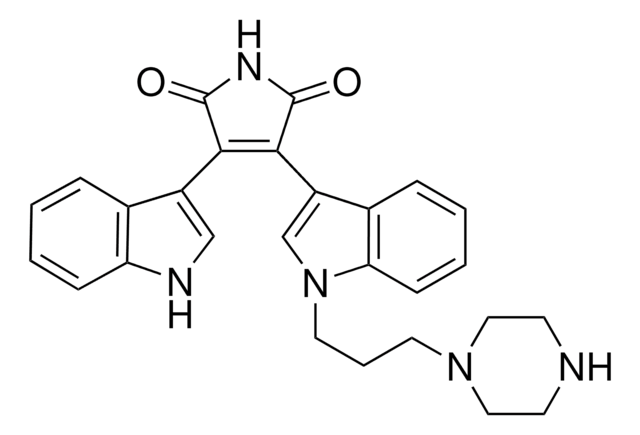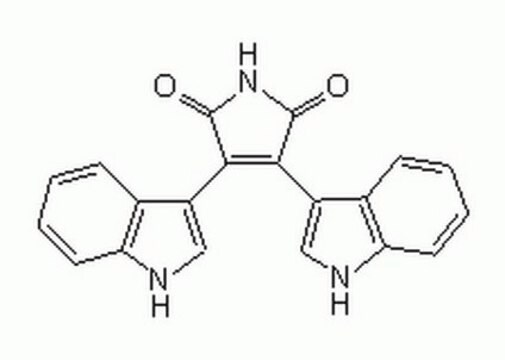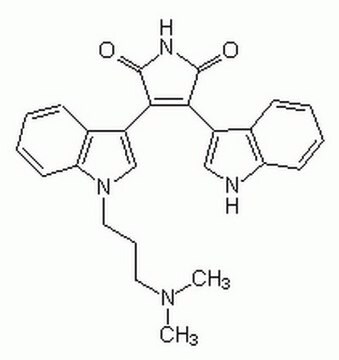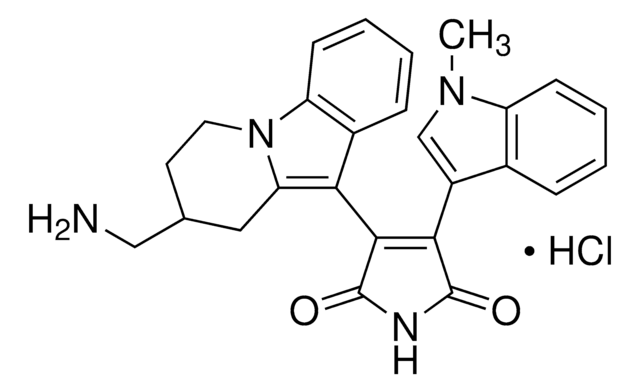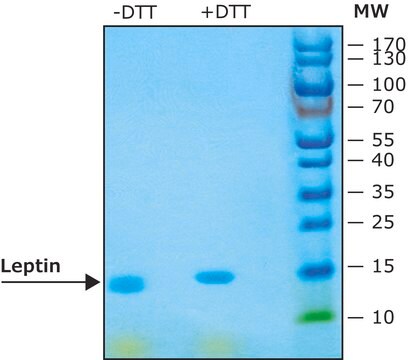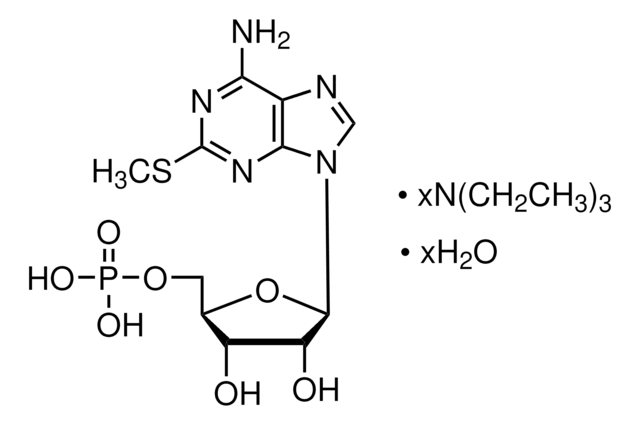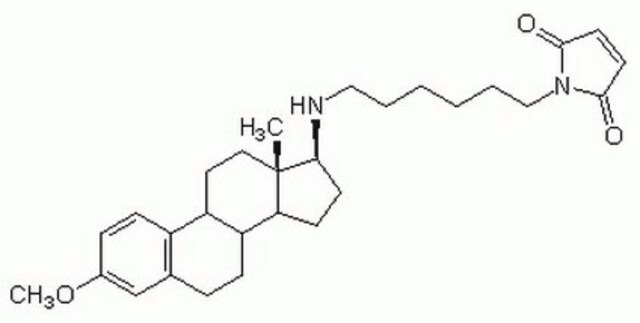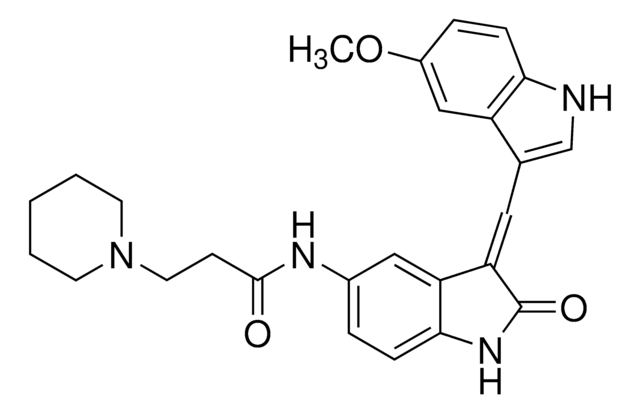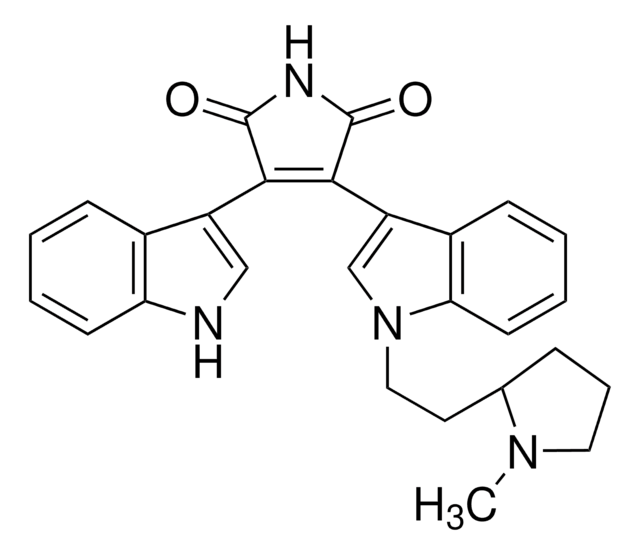B3306
Bisindolylmaleimide IV
≥98% (TLC), solid
Synonym(s):
Ro 31-6233
Sign Into View Organizational & Contract Pricing
All Photos(1)
About This Item
Empirical Formula (Hill Notation):
C20H13N3O2
CAS Number:
Molecular Weight:
327.34
MDL number:
UNSPSC Code:
12352111
PubChem Substance ID:
NACRES:
NA.77
Recommended Products
biological source
synthetic (organic)
Quality Level
Assay
≥98% (TLC)
form
solid
color
dark red
solubility
DMSO: soluble
methanol: soluble
storage temp.
−20°C
SMILES string
O=C1NC(=O)C(c2c[nH]c3ccccc23)=C1c4c[nH]c5ccccc45
InChI
1S/C20H13N3O2/c24-19-17(13-9-21-15-7-3-1-5-11(13)15)18(20(25)23-19)14-10-22-16-8-4-2-6-12(14)16/h1-10,21-22H,(H,23,24,25)
InChI key
DQYBRTASHMYDJG-UHFFFAOYSA-N
Gene Information
human ... CDK2(1017) , EGFR(1956)
rat ... Prkca(24680)
Biochem/physiol Actions
Bisindolylmaleimides (BIM) comprises a group of 11 compounds from BIM-I to BIM-XI. BIMs act as an inhibitor of protein kinase C (PKC). They are derived from staurosporine. BIM IX due to its proapoptotic functionality could be useful in targeting tumor proliferation.
Storage Class Code
11 - Combustible Solids
WGK
WGK 3
Flash Point(F)
Not applicable
Flash Point(C)
Not applicable
Personal Protective Equipment
dust mask type N95 (US), Eyeshields, Gloves
Choose from one of the most recent versions:
Already Own This Product?
Find documentation for the products that you have recently purchased in the Document Library.
Hui He et al.
The Prostate, 70(10), 1119-1126 (2010-03-25)
We have reported that human prostate cancer ARCaP(E) cells undertake epithelial to mesenchymal transition (EMT) when stimulated by certain soluble factors, and that EMT is regulated by surface receptor-elicited signaling pathways through protein phosphorylation. It is known that phorbol ester
Gérard Prulière et al.
Molecular biology of the cell, 22(12), 2042-2053 (2011-04-22)
The atypical protein kinase C (aPKC) is part of the conserved aPKC/PAR6/PAR3 protein complex, which regulates many cell polarity events, including the formation of a primary cilium at the apical surface of epithelial cells. Cilia are highly organized, conserved, microtubule-based
Shihe Li et al.
Molecular and cellular neurosciences, 48(1), 62-71 (2011-06-29)
Peroxynitrite has been suggested to be the potent oxidant causing toxicity to neurons and oligodendrocytes (OLs). Our previous studies have illustrated that intracellular zinc liberation contributes to peroxynitrite toxicity to mature OLs. In this study, we further investigated the signaling
Sibasish Dolai et al.
Proteomics, 11(13), 2683-2692 (2011-06-02)
Basal-like breast cancers are commonly negative for expression of estrogen and progesterone receptors and HER-2 (triple-negative breast cancer), which makes this subtype of breast cancers more aggressive and less responsive to standard treatment. We have applied a small-scale chemical proteomics
Abdullah Mayati et al.
PloS one, 10(12), e0144667-e0144667 (2015-12-15)
Ro 31-8220 is a potent protein kinase C (PKC) inhibitor belonging to the chemical class of bisindolylmaleimides (BIMs). Various PKC-independent effects of Ro 31-8220 have however been demonstrated, including inhibition of the ATP-binding cassette drug transporter breast cancer resistance protein.
Our team of scientists has experience in all areas of research including Life Science, Material Science, Chemical Synthesis, Chromatography, Analytical and many others.
Contact Technical Service